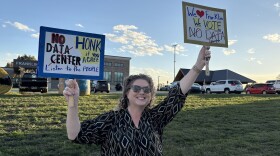The Louisville Economic Development Alliance, or LEDA, was created a year ago to help bring new jobs to the city. Trevor Pawl is LEDA’s executive director. He spoke with LPM’s Bill Burton about the organization’s work thus far and his goals for the future.
This conversation has been edited for brevity and clarity.
Bill Burton: So let's talk about the concept of the public private partnership, which is what LEDA is. How does it work in this particular instance?
Trevor Pawl: The Louisville Economic Development Alliance is a 501 c6, and this partnership may be new to Louisville, but all of the cities that punch above their weight in economic development have some version of a LEDA in their market. Columbus has it. Indy has it, Nashville has it. Cities that you're like, how did that factory – how did that [research and development] center locate there? It's typically because there's a regional economic development partnership at play, helping work the deal alongside the state, alongside the city. So by now having a public private partnership exclusively focused on creating net new jobs and innovation, working alongside, say, [Greater Louisville Inc.] and alongside Metro Government, we are really now in the big leagues of economic development.

BB: What does LEDA need to accomplish for you to consider it a success?
TP: For me, I look at our industry diversity. So I'm from Detroit. Detroit is a one industry town, granted, it's a massive industry, so it's a real gift to be able to work in a place that has such industry diversity.
Now the issue is, despite being a top 50 Metro, we are not a top 50 when it comes to industry wages. So I'd like to go a bit more vertical in some of these sectors that we absolutely have a right to win. More R and D, more engineering industries like logistics, manufacturing, food and beverage, health care. We can be the best place in America to grow a company if you're in one of these sectors. And now we just got to tell the story.
BB: Your board is made up of members that mostly have to pay dues to be on the board of up to $100,000. Who makes up the board, and what do those dues get those individuals?
TP: We have 50 plus members of our board. It is a large board, and our executive committee is 20+ people. We wanted a good cross section of the economy. We wanted all the major sectors represented, small businesses represented. Companies do pay in. A public private partnership requires each side to invest. Benefits of that, I think, for the public sector, is it helps lessen the financial burden to do economic development, which can be expensive.
There's a lot of work and resources necessary to get a company to locate in your town. And for the private sector, it helps demystify some of the processes around government, simplify, streamline where needed. By being a dues paying board member, you're essentially providing resources to help us begin to tell Louisville’s story in a new way.
BB: You mentioned small businesses. There are plenty of small businesses that can't afford that to be on the board. Do you work with those businesses as well?
TP: Yeah. Well, I mean, you did mention the max, which is $100,000. When, you know, when we initially went out to talk to businesses, we said, what can you give? We didn't have direct asks or levels or tiers. It was how much do you believe in this? And is it possible for you to provide resources?
So in some cases, small businesses clearly can't afford $25,000, $50,000, $100,000. So, we said, “Whatever you can give.” And that's how we're operating with it.
And frankly, as I look at the future of our board, and we're only a year old, so we're still sort of operationalizing, trying to figure out what the best board engagement model is, but I see more small business involvement in year two and year three.
BB: Are you pleased with what you've seen so far?
TP: Absolutely. I'll give you a great example of an awesome win: GE Appliance. They just announced a new production platform for a washer dryer, and that's going to be 800 jobs, nearly $500 million in [capitol expenditure]. That particular project is a great example of how LEDA worked with the state to coordinate a quick response during complex budget negotiations between Metro Council and the mayor's office. We took a time out, got together and said, “What can we do to ensure that this company remains in Jefferson County?” and we came up with a pretty unconventional, creative solution to ensure that happened – along with the state – in a matter of weeks.







